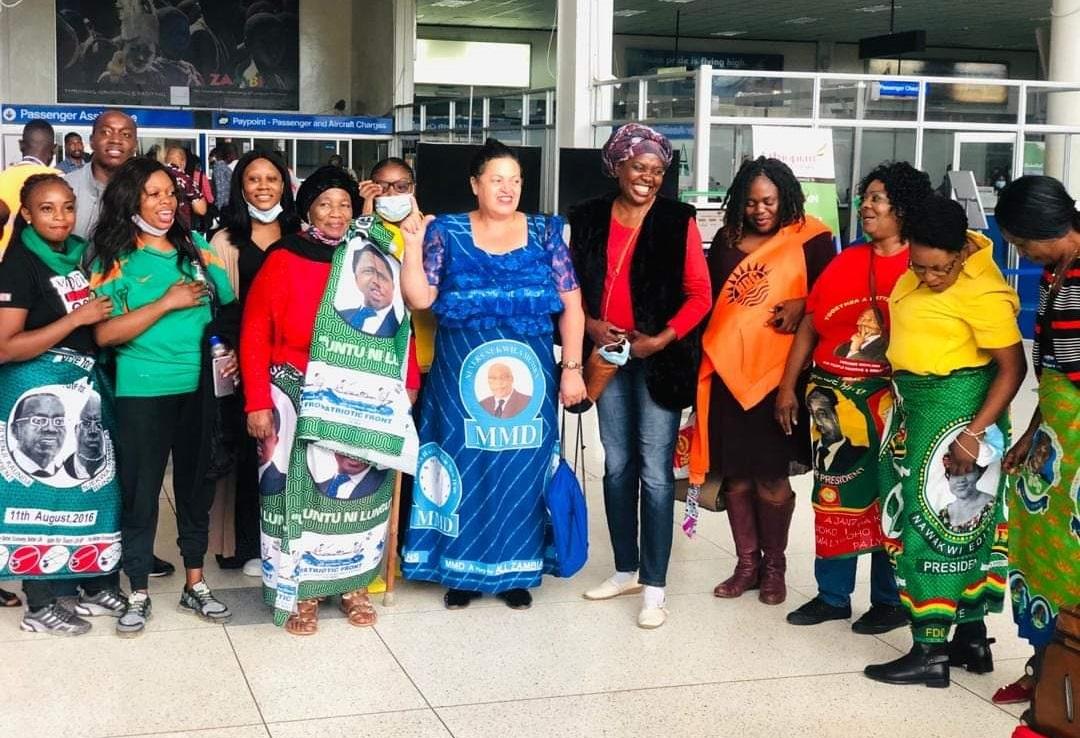Sisters from other parties, strengthened voice of women and opportunities to advance in the party – women’s multi-party platforms have had many effects in Zambia. According to an external evaluation completed this autumn, the permanent dialogue platforms bringing together women from different parties have been among the most significant successes of the programme supported by Demo Finland.
The evaluation covered the years 2018–2021, but the programme in Zambia began as early as 2013, when Demo Finland and Zambia National Women’s Lobby (ZNWL) launched a programme to promote women’s political participation. Programme activities have included trainings for female municipal councillors and candidates, political parties and their women’s wings, advocacy work towards parties and support for multi-party co-operation between women. The programme works in three districts (Kaoma, Kapiri Mposhi and Lusaka) as well as at the national level.
Support for strengthening women’s political participation is much needed, as women’s representation at different levels of politics in Zambia is very weak. Although the elections in August 2020 were successful from the perspective of a peaceful change of power, in terms of gender equality, the election result was disappointing. The proportion of women MPs fell from 17% to 13%, and at the municipal level the proportion of women is even lower. Women’s political participation is hampered by, among other things, high candidate fees, electoral violence and harassment, and patriarchal attitudes.
Dialogue platforms enhance co-operation
With the support of Demo Finland and ZNWL, political parties’ women’s wings have established the National Women in Politics Platform (NWIP) and Local Women in Politics Platforms (LWIP) in the three above-mentioned districts. Each platform has 27 members, and their executives have one representative from each of the nine parties involved in the programme.
The platforms have gathered about three times a year, in addition to which the NWIP has had online mentoring meetings with Finnish women politicians. The meetings were carried out in co-operation with NYTKIS, an umbrella organisation that brings together political women’s organisations in Finland. Members of the NWIP executive also participated in a study visit to Rwanda to learn about good practices to promote women’s political participation.
Dialogue platforms have succeeded in building trust between women from different parties and in creating a safe space where politicians can share ideas and experiences on promoting gender equality in politics. Prior to the establishment of the platforms, women did not have an established place for co-operation and networking, and representatives of other parties were seen primarily as political opponents and enemies.
Dialogue platforms have succeeded in building trust between women from different parties and in creating a safe space where politicians can share ideas and experiences.
Under the 2021 general election, these networks created opportunities for joint campaigning. Platform members from different parties campaigned together at the municipal level, which aroused astonishment among voters: “During the 2021 elections I took my sister from another party, and we went out to campaign together. People asked why we campaign together although we are from opposing parties, and we told them that we are both women and we have the same cause, therefore we support each other”, says a platform member interviewed in the evaluation. ZNWL’s role as a trusted and neutral facilitator has been crucial in establishing the platforms.
Political parties’ women’s wings have also united behind joint media statements in the platforms, and participants have found it easier to raise joint concerns together as platform than alone within their party. Topics have included, for example, gender-based violence and harassment of women in politics. In addition, the platforms have engaged in joint community development initiatives and joint fundraising for local projects.
Impact at the individual level
In addition to enhancing co-operation across party lines, dialogue platforms have increased women’s influential and active participation within their political parties and in political processes. More than half of the platform members have advanced in their respective parties, some up to the party leadership. The skills and experience gained in the dialogue platforms have contributed to this progress: “It is with thanks to the platform that I have been able to rise as the President of my party. For my party to see that I have confidence given by women across multiple parties and a leading role within the platform greatly enhanced my selection as the party President”, says Saboi Imboela, Chairperson of the NWIP.
Dialogue platforms have increased women’s influential and active participation within their political parties and in political processes.
“It has been a pleasure to see the dialogue platforms becoming well-established and co-operation between political parties’ women’s wings strengthening. Our partner ZNWL is a respected organisation in Zambia and has succeeded in bringing the parties’ women’s wings together despite the tense political situation of the country in recent years”, says Demo Finland’s Programme Manager Hanne Lyytikkä.
Demo Finland’s programme in Zambia ends in 2022. Activities during the last year will focus on strengthening the local-level dialogue platforms so that they can continue working without Demo Finland’s support. In addition, the advocacy skills of the platforms will be enhanced and political parties will be supported in finalising and implementing their gender equality plans.

